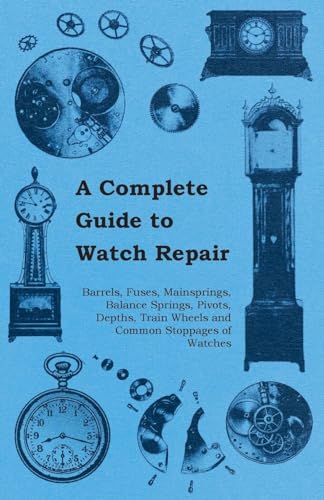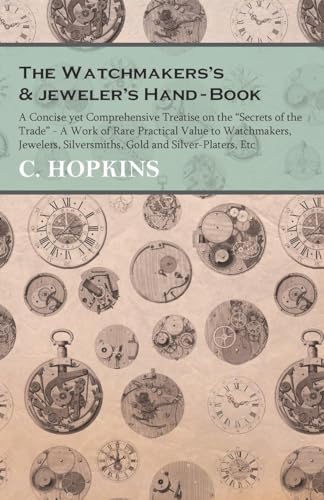In the fast-paced world we live in, time is of the essence, making the ability to repair watches a valuable and highly sought-after skill. The “Watch Repairer’s Manual: Master Timepiece Restoration Techniques” is a comprehensive guide that delves into the intricacies of the trade, providing expert insights and step-by-step instructions on restoring and repairing timepieces. Whether you’re a seasoned professional or a novice with a passion for horology, this manual is a must-have resource for honing your craft and bringing cherished watches back to life.
Watch Repairer’s Manual
The Watch Repairer’s Manual” is an essential resource for watch enthusiasts and professionals alike. Written by the renowned watchmaker Henry B. Fried, this book has solidified his legacy as the dean of American watchmakers. Originally published in 1948, the revised 1961 edition, which is reprinted here, showcases Fried’s expertise and captures the intricacies of watch repair in a comprehensive manner.
In this manual, Fried delves into various important topics relevant to modern watch repair. He covers everything from identifying different watch parts and their functions to diagnosing common problems and implementing effective solutions. Fried’s attention to detail is evident throughout the book, as he provides step-by-step instructions and practical techniques to ensure successful watch repair.
Whether you are a seasoned watch repairer or just starting your journey in horology, “The Watch Repairer’s Manual” is an invaluable guide. Fried’s expertise shines through as he simplifies complex concepts and presents them in a clear and accessible manner. With detailed illustrations and diagrams, readers can easily visualize the intricacies of watch mechanisms and gain a deeper understanding of the craft.
“The Watch Repairer’s Manual” has been a trusted resource for watchmakers for decades, and its timeless content continues to be relevant in today’s world. It is a must-have for anyone passionate about watches and eager to learn the art of watch repair from one of the industry’s most esteemed experts.
The Watch Repairer’s Manual” is an essential guide for anyone interested in the art of watch repair. This revised edition addresses contemporary watch topics, making it highly relevant for both new and experienced watchmakers.
One of the standout features of this book is its author, Henry B. Fried. As the widely acknowledged dean of American watchmakers, Fried brings a wealth of knowledge and expertise to his writing. His years of experience in the industry shine through in the comprehensive and meticulous instructions provided in this manual.
The book covers a wide range of topics, including the history and identification of watches, tools and equipment needed for repair, and step-by-step procedures for common repairs and adjustments. From basic repairs, such as cleaning and oiling, to more advanced techniques like mainspring replacement and escapement adjustments, Fried covers it all with great detail and clarity.
One aspect that sets this manual apart is its attention to the practical aspects of watch repair. The author provides valuable tips and tricks acquired through years of hands-on experience. These insights are incredibly valuable, as they help avoid common pitfalls and make the repair process more efficient.
The book is well-organized, with each chapter focusing on a specific aspect of watch repair. The language used is precise and accessible, making it easy for readers to follow along. The inclusion of numerous illustrations and diagrams adds to the clarity of the instructions, making it even easier to grasp the concepts discussed.
While the information presented in this manual is comprehensive, it is important to note that it assumes some prior knowledge of watchmaking and repair. This may be overwhelming for absolute beginners, but for those with a basic understanding of watches, it serves as an excellent reference guide and learning tool.
In conclusion, “The Watch Repairer’s Manual” is a must-have resource for aspiring watchmakers and seasoned professionals alike. With its revised edition and coverage of contemporary watch topics, it remains relevant in a changing industry. Henry B. Fried’s expertise and attention to detail make this manual an invaluable asset for anyone passionate about the art of watch repair.
Explore alternative resources for watch repair guidelines and instruction
Review of The Watch Repairer’s Manual: Insights from a Skilled Watchmaker
Choosing the Right Reference Material for Watch Repair: A Buyer Guide
When it comes to selecting books or manuals on watch repair, there are a few key factors to consider. Firstly, it is important to choose books written by renowned experts or experienced watchmakers. This ensures that the content is reliable, accurate, and comprehensive. Additionally, look for books that cover a wide range of watch styles and brands, as this will allow you to handle various repair projects. It is also beneficial to search for manuals that provide step-by-step instructions with clear illustrations, making it easier to follow along and understand the repair techniques. Finally, reading reviews and recommendations from trusted sources or fellow enthusiasts can help guide your decision, ensuring you choose a book or manual that is highly regarded in the watch repair community.
- Comprehensive Content: Look for a manual that covers a wide range of watch types, brands, and models. It should include information on both mechanical and quartz watches, as well as complications like chronographs, calendars, and moon phases
- Step-by-Step Instructions: A good manual should provide clear and detailed step-by-step instructions for various repair and maintenance tasks. Make sure it includes troubleshooting tips, disassembly and reassembly procedures, and adjustment techniques
- Illustrations and Diagrams: Look for a manual that is richly illustrated with diagrams, photographs, and schematics. Visual aids can greatly enhance your understanding of the repair processes and help you identify different watch components
- Technical Terminology: Ensure the manual uses technical terminology that is easy to understand and accurately describes the watch parts. It should also provide explanations of any specialized industry jargon or abbreviations
- Historical References: If you have an interest in vintage or antique watches, consider a manual that delves into the history of various watch brands, movements, and styles. This knowledge can be valuable when working on older timepieces
- Trouble Diagnosis: A good manual should include a section on diagnosing common problems or malfunctions in watches. It should guide you through a systematic approach to identify issues and offer solutions
- Equipment and Tools: Ensure the manual provides information on the necessary tools and equipment required for watch repair. Look for details on specific tools needed for different tasks, as well as tips on sourcing quality tools
- Safety Guidelines: Consider a manual that includes safety guidelines and precautions for working with watches and watchmaking tools. This is crucial to avoid accidents and potential damage to the watch or oneself
- Reference Charts and Tables: Look for a manual that includes reference charts and tables for things like movement calibers, crown and stem measurements, spring specifications, case sizing, and more. These can be handy references when working on specific watch models
- Updates and Revisions: Check if the manual has regular updates or additional volumes available, as watch technology and models constantly evolve. Having access to updated information ensures you stay current with the latest repair techniques
Signs that indicate the “Watch Repairer’s Manual” is not suitable for you.
- Lack of relevant experience: If you have no prior background or interest in watch repair, it may be a clear sign that “The Watch Repairer’s Manual” is not meant for you. This product is targeted towards individuals who already possess basic knowledge or skills in watch repair
- Complexity and technical language: If the manual is filled with complex jargon or technical terms that are beyond your understanding, it indicates that the product is better suited for professional watchmakers or enthusiasts, rather than beginners or casual hobbyists
- Lack of visuals or step-by-step instructions: If the manual is primarily text-based without any visual aids or detailed instructions, it may not be suitable for beginners. Watch repair often requires hands-on demonstrations and illustrations to understand the intricate processes involved
- Limited scope: If the manual only covers specific types or models of watches that you do not own or are not interested in repairing, it suggests that the product may not be suitable for you. Ensure that the content aligns with your specific needs and interests in watch repair before purchasing
Essential Watch Repair Terminology
- Swiss Made: This term refers to the origin of the product. Swiss Made horology refers to watches that are entirely designed, assembled, and tested in Switzerland. The label demonstrates the high quality and precision associated with Swiss watchmaking
- Horology: Horology is the science and study of timekeeping devices, particularly watches and clocks. In the context of Swiss Made horology, it refers to the art and craftsmanship involved in creating fine Swiss watches
- Movement: Movement refers to the internal mechanism of a watch that powers its timekeeping function. Swiss Made watches are renowned for their intricate movements, often made with high precision and attention to detail
- Chronometer: A chronometer is a highly accurate and precise timekeeping watch that has undergone rigorous testing by a Swiss testing institute, usually the Contrôle Officiel Suisse des Chronomètres (COSC). Watches that meet strict accuracy standards are awarded the chronometer certification
- Swiss Movement: Swiss movement refers to the internal mechanism of a watch, developed and manufactured in Switzerland. Swiss Made horology often prioritizes the use of Swiss movements due to their reputation for outstanding quality, precision, and reliability
- Watchmaking Tradition: Swiss Made horology is built upon a rich heritage and tradition of watchmaking that spans several centuries. This term refers to the long-standing craftsmanship, expertise, and artistry passed down through generations of Swiss watchmakers, resulting in exceptional timepieces
Discover the invaluable knowledge and expertise of watch repair with “The Watch Repairer’s Manual”. Dive deep into the intricacies of timepiece maintenance and repair, unveiling the secrets of watch mechanics. Unlock the world of horology and enhance your understanding of this timeless art form with this comprehensive manual. Don’t miss the opportunity to embark on a journey of skill-building and appreciation for the intricate beauty of watches.







